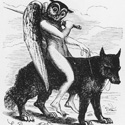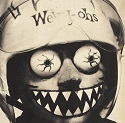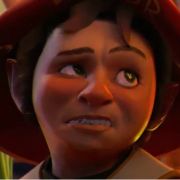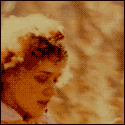|
Ahh. Superpast, I get it. Thanks. I might try and work around having to do it, it feels a bit weak.
|
|
|
|

|
| # ? May 10, 2024 17:29 |
|
Panda So Panda posted:To be safe, I would say historical fiction. Thanks for the advice everyone. I think historical fiction is the way to go unless an agent specifically mentions looking for westerns.
|
|
|
|
Hey, cross posted from the self publishing thread. I hadn't yet discovered this one and only now just realized it's better suited here. The greatest tip I ever got and ignored for the longest time was the corkboard method of developing stories. Basically, you get yourself a corkboard and cut up a bunch of index cards. On each card, write a scene. It doesn't have to be detailed, just so long as you understand what it is and maybe include some important parts you wanna include (i.e. '-character- first mentions -flashy magyck-). Then organize them on the board. It's okay if there are blank patches. The point of this little process is to see where you are weak and what parts need expanding upon.  Here's the corkboard for my most recent story. Some index cards just have ???. When I first threw this together, many index cards had ??? but then I slowly fleshed it out. Now, when I originally heard this tip my first thought was NO THIS DESTROYS THE CREATIVE PROCESS. But the corkboard is not god. If you decide to change it, great. But as a visual person, it really helped me get an idea of what my whole story looked like, rather than just bits and pieces I'd thought of. When I hit a huge writer's block, I finally broke down and just tried the corkboard. And it not only revitalized me, but it also helped me realize 'oh poo poo, the scene shouldn't go there' or 'ok, the character needs to mention that earlier'. It also made the whole process seem less daunting. After all, there was my story. I just needed to tackle it step by step. I also converted it to a word document I carry around in dropbox. So, when I force myself to sit down and write and cannot will anything to come about, I pull up the corkboard doc and see where I left off. Then I can just write the next chronological scene. Even if it's not great or super in-the-moment-creative, it's down on paper. Improving it is for allllllll those rounds of editing. And if I get inspiration and write something out of order or not included on the corkboard (which I do all the time), great! Just integrate it.
|
|
|
|
There's a program that does that, Scriber, I think?
|
|
|
|
Reivax posted:There's a program that does that, Scriber, I think? Scrivener. I use it, and I use the corkboard feature extensively. I still think there's some value to having a real, tactile board, especially for bigger pieces, and I'm planning on getting one myself sooner or later. Plus some whiteboards. I love whiteboards.
|
|
|
|
Yeah, but I prefer the real world corkboard. Like erogenous mention, there's something about having something tactile. I like to add photos and other interesting things to it. It also sits in a prominent place in my house, so I'm always reminded of the project.
|
|
|
|
I love Scrivener myself, but I have to mention P.G. Wodehouse's editing method as it's similar to the corkboard method for outlining. He used to cut up all his scenes and pin them to the wall. He'd organise them by importance by pinning them higher or lower on the wall, and pin them crooked if they needed a rewrite. He wasn't satisfied with a story until all the scenes lined the wall in a single neat row. Now, I wish I could do that in Scrivener, but I settle for color-coding my index cards to indicate how far along a chapter/scene is in the revision process because I don't have enough wall-space to do that with physical paper.
|
|
|
|
I think I'm becoming obsessed with stupid things. Maybe I've been reading too many writing books at once, hell if I know. I'm killing myself over PACING. How much space do i commit to each of these parts: - Dialog - Action - Backstory I don't want to go overboard with exposition, and dialog helps set up poo poo, especially when mixed with action, but too much action and you're just sort of doing exposition-in-the-moment, aren't you? Example: This sentence is which? Backstory, Dialog, Action, or Exposition? Frank said, "Yesterday Chuck smacked a ho in the face and then threw her out of his limo." I've got a gently caress TON of that happening in my story. It's written in a hosed up first-person kind of thing, talking about a second person's reaction to the events that are unfolding. Think like I Claudius, where this guy tells the story of all these other people doing all sorts of hosed up poo poo to each other.
|
|
|
|
magnificent7 posted:I think I'm becoming obsessed with stupid things. Maybe I've been reading too many writing books at once, hell if I know. I suppose it depends on the purpose of the sentence. If it serves no plot purpose, it may be more to show the character as being....an insensitive dick. However, if smacking a ho is necessary to the plot, then it might be backstory or plot development. I'd definitely call it dialogue and not action. But I wouldn't get too caught up on the technicals of it all, especially when you are just fleshing out a story. Just write it. Get it out. If you get stuck, go back and edit. If not, plug away. Once you are finished (or stuck) that's when you go back and look at all this and determine whether it sounds natural or repetitive. It's not necessarily bad to use dialogue to describe plot if it works . However, you may find that it gets redundant or unnatural if you rely on it too much. I guess it depends on whether the characters are ever present to witness the action (and thus present for you to describe). tl:dr Ask yourself if there is a reason why your characters are having to describe the action rather than YOU describe the action. As I said, it's not necessarily wrong if it works. And that's something a lot of writing books don't tell you. You can break the rules of pacing and plot development and dialogue all you want. It's your story. But make sure it sounds good (and that's for you and your friendly editors/readers to decide. But right now, just try to get the story out. Hope that helps/
|
|
|
|
Very much so. Thanks!
|
|
|
|
into the void posted:Hey, cross posted from the self publishing thread. I hadn't yet discovered this one and only now just realized it's better suited here. What's funny is I was just going to come in here and ask if anyone uses the corkboard method. A friend of mine, who's a screenwriter and worked on some pretty serious stuff, recommended this to me. We had conversed on the fact that I've had this awesome story idea since I was in high school and have refined it in my head over and over, and was finally ready to attempt to do something with it. Even though I have exact scenes planned out too every detail, I have many gaps where I just think "I need to make a transition from here to here, but how I'm going to do it is beyond me". My friend had stated this to be the perfect method on seeing what exactly I am missing, and he stated it helps when attempting to visualize weak points in a story, as well as keeping general track. I'm starting this evening on it, and I'm going to be stopping by this thread/subforum copiously to bounce problems/ideas/frustrations off goons.
|
|
|
|
Runefaust posted:What's funny is I was just going to come in here and ask if anyone uses the corkboard method. A friend of mine, who's a screenwriter and worked on some pretty serious stuff, recommended this to me. We had conversed on the fact that I've had this awesome story idea since I was in high school and have refined it in my head over and over, and was finally ready to attempt to do something with it. Even though I have exact scenes planned out too every detail, I have many gaps where I just think "I need to make a transition from here to here, but how I'm going to do it is beyond me". Absolutely! I think you'll find the method will boil everything down so you don't feel so overwhelmed. At least it does for me.
|
|
|
|
Ah finally caught up with this glorious thread. I've been caught with work and life and all those other lovely reasons to not be writing (ALWAYS BE WRITING). A friend who's reading through my novel so I can finally edit it for a final loving time and throw it to the wind linked me a writing contest that has an end of the month deadline. It's got a prize but I'm not too concerned about winning, it's just fun to finally be free of editing an old story I've sat on forever and working on something fresh. Anyway I'm actually here for some help, the writing cap is 3500 and while I've written flash fiction before nothing at that restraint. It's both much longer and shorter than I'm used to. My current idea for it is a faux noir set up to a silly detective story about a paranormal detective who isn't terribly good at his job. The trouble I'm running into is I'm about 1000 words in and currently have the set up and case established but am wringing my hands over how I plan to wrap it up with another 2500. I'm fairly confident I can work something out about it but do you guys have any advice for writing under 3500 words? Especially for something with a loose detective story trapping. I imagine I'll be busy chopping down as much unnecessary wording as possible. On a separate note, I find whenever I'm writing characters, other than my main character, and I'm about to decide their gender I ask myself if swapping it would change anything and then I swap them. It's helped me interject a lot more female characters into my writing than I'd of normally had without changing the work or calling too much attention to it by being arbitrary. That said I am entirely uncomfortable writing a female main character, anyone currently write either gender comfortably regardless have any advice for tackling this?
|
|
|
|
What about writing a female protagonist makes you uncomfortable? It's hard to help you out with it when we don't know exactly what the issue is.
|
|
|
|
Pladdicus posted:My current idea for it is a faux noir set up to a silly detective story about a paranormal detective who isn't terribly good at his job. The trouble I'm running into is I'm about 1000 words in and currently have the set up and case established but am wringing my hands over how I plan to wrap it up with another 2500. I'm fairly confident I can work something out about it but do you guys have any advice for writing under 3500 words? Especially for something with a loose detective story trapping. This week's Thunderdome prompt is very close to this, but with a 1200-word limit. Have you considered entering? It'd be good practice, and you'll find out what works and what doesn't at 1200 words. Some ideas just won't fit in very short word-counts. You can't do a lot of exposition or world-building; you have to focus on a core plot. If your story involves a lot of sub-plots that all revolve around a main plot, you're obviously going to need lots more words. Build a small, well-contained plot for a shorter story. In extreme cases (<1000 words), you may only be able to do the one scene where your character confronts his/her demons. Make it a good one. For very short stories, I look towards really classic, basic, relatable story-lines. You have enough time to present one, maybe two problems and have your characters struggle with them. What's your absolute core story? Is it about redemption? Love? Freedom? Dump all your subplots, or only use pieces them to reveal flavor and depth. Focus on your main character and the main problem. Caveat: I'm very much an outliner type when it comes to writing. I do a lot of planning before I start drafting, usually. This may or may not work for you. You haven't given us many details, but what changes about the detective in your story? Is he going to learn to accept his incompetence? Find a job he's better at? Or is there something inside him that's making him a bad detective, something he regrets and has to face? (Gonna say "he", "him" and "his" a lot here, but that's just shorthand, k? Transpose it if you need to.) Then, is your story a tragedy or a comedy, in the classical sense? Does he "win" and overcome his problems, or does he struggle and fail? Either way, you now know your ending. What sets your detective off on his journey of discovery? Classically, this is the receipt of a mysterious case, but it could be anything that relates to the change that needs to take place. In a very short story, you'll want to start with something relatively proximate to your ending. So, if your detective is struggling to forgive himself for a case he blew, then he should have something shoved in his face that forces him to deal with this demon. Make your character immediately start dealing with The Big Problem from word 1. Now sketch out a rough budget your remaining words - this is just a tool, not a strict rule. For your 3500 word story, let's budget 500 words for the opening scene and 500 words for the closing scene. That's 1000 words, so you need about 2000-2500 more. Budgeting for additional 500-word scenes gives you room for 4-5 plot developments. Boom, outline for a targeted 3000-3500 word story. Find things where your character struggles with the problem presented. Your hero has received the Intriguing Case. Does he accept the case? Reject it? This is your chance to show us some character nuances and some inner conflict. Maybe he cannot bear to consciously accept, the case reminds him too much of the case he blew (his demons). But, something about the Femme Fatale who brings it to him is intriguing (what is it?) and he finds himself outside her door at 3 AM, despite not really wanting to be there. And then he witnesses her getting murdered. There, you've got probably 1-2 plot developments down, come up with 2 more. How does your character react to each of these developments? Once you have your outline and word budgets down, go forth and draft your scenes. Don't worry about the word budgets at all while drafting. Just write your story, using your outline to keep your plot on track. You'll probably end up way over word-count, but if your plot sticks to your outline and you don't go off on wild tangents, you should be in shooting distance. Go back over your story with a clear head and look at each scene in detail. How does your dialogue and action contribute towards revealing your main character's inner struggle? Think hard about every sentence and description. You can cut a lot of description if you're focusing on the action. We don't need to know about every coathook and potted plant. If you show it to us, you're drawing our attention, which means it better either be immediately relevant, or, better yet, it should become relevant down the line (Chekhov's Gun principle). If you do go off on wild tangents, you'll see it - you'll find scenes and action that don't match well with your outline. Think hard about these; do they move your story closer to its resolution than what you planned, or do they accomplish the same thing but in a more interesting way? If so, fix your outline. Otherwise, cut/adapt the tangent.
|
|
|
|
Martello posted:What about writing a female protagonist makes you uncomfortable? It's hard to help you out with it when we don't know exactly what the issue is. I think it's that I feel like it'd be writing the same character with another skin, the issue becomes that it just feels under utilized, that there are interesting things to say about gender even if it's not a very deterministic quality. I find I want to acknowledge that there should be -some- difference if the gender changes but that I have trouble finding where in the hell that change might be. So while I feel it's fine that I make secondary or supporting characters, my main character who I focus on their thoughts far more is usually male just because of that comfort. Erogenous Beef posted:Excellent words Yes I've nervously eyed the Thunderdome from afar, with my new job starting up I think it'll be a perfect way for me to flex my writing and improve despite not having the time to devote to big projects. That's the issue I'm running into now, detective stories usually have a lot of nuanced plots and clues and misdirects so I'm concerned about cutting that down and trimming for 3500 words. It may be poor genre, especially for me who's not the most experienced with it, which is pretty much why I chose it in the first place, but I'm starting to think it may be quite doable if I'm smart about my pacing thanks. I'm not much of a planner when it comes to writing, usually I'll mull an idea out in my head for a few days then write furiously and adjust as necessary, out of curiosity what's your method of planning? These questions are all incredibly helpful, I don't think you're really looking for me to answer them in the thread. I really like the idea of figuring out a set of scenes before hand, writing them out and then hacking away at them to streamline them.
|
|
|
|
Pladdicus posted:I'm not much of a planner when it comes to writing, usually I'll mull an idea out in my head for a few days then write furiously and adjust as necessary, out of curiosity what's your method of planning? I haven't got a set method down, because I don't think there's anything in writing that will always work 100% of the time. Generally, it's as I've described. Figure out a Big Problem, figure out a Resolution, and the split up my remaining word-count into "intended plot twists". This is based off of doing the Snowflake Method a few times in a very strict way, figuring out which parts work for me and which don't. Once I've got the big picture, I usually write down some character-establishing material. Sometimes this takes the form of scenes with the character that I never intend to use - these are just things like the character going about a daily routine, or an interesting past event. Other times it's a brief biographical summary. I've dabbled in doing interviews, where I pose questions and try to have the character answer them. For one of my projects, I have a bunch of essays written "by" the character presenting his political views on in-world events. The core of it all, though, is figuring out what the character wants, and realizing that this often differs between conscious and subconscious desires. There's a good article on this that I'm entirely failing to find at the moment. Once you know how it starts, how it ends and what the character is, I find it's just about rolling from situation to situation. If the character is here, and this happens, how does the character react? How does that make things worse? That's a scene right there, move to the next one. Just keep asking questions about your plot and your characters. I like to take notes about my answers and go over my planned scenes to make sure that the motivations and reactions remain consistent. quote:These questions are all incredibly helpful, I don't think you're really looking for me to answer them in the thread. Most of the questions I asked are the ones you should be asking yourself. If Character A does this, how does Character B react? What does Character B do in return, how does that impact character A? Repeat.
|
|
|
|
Pladdicus posted:I think it's that I feel like it'd be writing the same character with another skin, the issue becomes that it just feels under utilized, that there are interesting things to say about gender even if it's not a very deterministic quality. I find I want to acknowledge that there should be -some- difference if the gender changes but that I have trouble finding where in the hell that change might be. So while I feel it's fine that I make secondary or supporting characters, my main character who I focus on their thoughts far more is usually male just because of that comfort. Ironically, I find it easier to write for men despite not being male, and I've spoken with other women who feel the same way. On one hand I've grown up reading books with male protagonists and watching films and shows with male heroes, so the viewpoint is anything but alien in the media I consume, but on the other hand there's also the fear of inserting myself too much into a female protagonist. It's not so much an issue with creating Mary Sues, more that I don't think as much about what *this character's* reactions or thoughts would be before I react with my own on the page. I find the comfort of writing in the same gender or culture can actually work against me, and by removing that comfort I focus more on what is true to the character -- not just their sex, but every aspect of their fictional identity that makes them an individual. It's also a personal preference thing: characters whose backgrounds and experiences are a few degrees removed from mine are more interesting to read and write. Crisco Kid fucked around with this message at 06:47 on Apr 20, 2013 |
|
|
|
Crisco Kid posted:Ironically, I find it easier to write for men despite not being male, and I've spoken with other women who feel the same way. One one hand I've grown up reading books with male protagonists and watching films and shows with male heroes, so the viewpoint is anything but alien in the media I consume, but on the other hand there's also the fear of inserting myself too much into a female protagonist. It's not so much an issue with creating Mary Sues, more that I don't think as much about what *this character's* reactions or thoughts would be before I react with my own on the page. I find the comfort of writing in the same gender or culture can actually work against me, and by removing that comfort I focus more on what is true to the character -- not just their sex, but every aspect of their fictional identity that makes them an individual. It's also a personal preference thing: characters whose backgrounds and experiences are a few degrees removed from mine are more interesting to read and write. An excellent point and probably properly sums up my issue, I'm afraid of stepping out from that comforting area of familiarity be it female or a person of another culture. I should probably add 'making sure these characters aren't too much like me' to my editting checklist to be extra careful. I make sure I speak for the character, not myself but I'm not sure I allow characters to deviate as far from myself as Imight like. I figure the best way to get used to this is to write what I'm uncomfortable with and then get it critiqued.
|
|
|
|
Join Thunderdome. one of us one of us
|
|
|
|
Martello posted:What about writing a female protagonist makes you uncomfortable? It's hard to help you out with it when we don't know exactly what the issue is. To expand on this a bit, you should force yourself to write female protags. Doing what makes you uncomfortable will make you a better writerr. If you can't write characters unlike yourself then you're in trouble. Like Martello said tho, it would help as to why it makes you uncomfortable.
|
|
|
|
I had an idea for a kinda Indiana Jones-ish pulp story with a female protagonist. It'd be set in the 20's and she'd generally avoid difficulties of working in male dominated field (archeology back when it was less a science and more treasure hunting) during a sexist era by disguising herself as a man. In this case, how would I handle pronouns? Do I just establish which scenes she's in disguise and continue to use "her" and "she" in the narration or do I switch when she changes personas? Which would be less confusing for a reader?
|
|
|
|
Crowetron posted:I had an idea for a kinda Indiana Jones-ish pulp story with a female protagonist. It'd be set in the 20's and she'd generally avoid difficulties of working in male dominated field (archeology back when it was less a science and more treasure hunting) during a sexist era by disguising herself as a man. I can't imagine changing pronouns would be helpful at all. As long as the reader knows the character is often in a gender-swapping disguise, there should be no issue in using a consistent pronoun.
|
|
|
|
Pladdicus posted:That's the issue I'm running into now, detective stories usually have a lot of nuanced plots and clues and misdirects so I'm concerned about cutting that down and trimming for 3500 words. It may be poor genre, especially for me who's not the most experienced with it, which is pretty much why I chose it in the first place, but I'm starting to think it may be quite doable if I'm smart about my pacing thanks. It's probably hard to do a really good mystery story in only 3500 words. It'll be hard to get in the twists, misdirections and red herrings and foreshadowing that a proper mystery has. I tried my hand at writing one for the Steam goons Christmas giveaway contest, and it came in at about 12,000 words. About 900 words were used to introduce the larger-than-normal supporting cast, so even if I stripped those away it'd be a lot, because I felt that it wouldn't be a proper mystery if I didn't have twists and false leads.
|
|
|
|
I've deciced that writing could be a way to vent my feelings regarding anthropogenic climate change, and, short of being big comapny CEO or a politican, at least provide me with an illusion that I'm trying to do something to influence people's opinions about it. Post-apocalyptic speculative fiction feels like a natural choice, and I have a basic plot for a couple of dudes eking it out After the End. The problem is how to present the end within the book. It would be basically two stories, one about the apocalypse, another about how people born after the end cope with it. Most books, like The Road, seem to gloss over the actual event or label it as inevitable, like a meteor strike, aliens attacking, total nuclear war etc. Some deal with the backstory in a prologue or with a few paragraphs, but I'd like it to be a continuing theme throughout the book. It may sound like a bad idea with the potential of boring the gently caress out of readers, when they most likely would like to conentrate on the characters and their emotions instead of some long rear end infodumps. But I think those dumps would serve a purpose by enchaning the character-driven parts, or that's what I say to myself  Anyways, how to mix the two? Some kind of an encyclopedia entry like in Isaac Asimov's Foundation before a chapter starts? Alternating between apocalypse and character chapters? Inserting a neverending wordy "This is John Galt speaking" rant somewhere? Any and all suggestions are appreciated, even the ones saying this is a poo poo idea from the get-go.
|
|
|
|
Stabbey_the_Clown posted:It's probably hard to do a really good mystery story in only 3500 words. It'll be hard to get in the twists, misdirections and red herrings and foreshadowing that a proper mystery has. I tried my hand at writing one for the Steam goons Christmas giveaway contest, and it came in at about 12,000 words. About 900 words were used to introduce the larger-than-normal supporting cast, so even if I stripped those away it'd be a lot, because I felt that it wouldn't be a proper mystery if I didn't have twists and false leads. I think I'm looking at this less of a full blown mystery and more a segment of a fuller story. I'm focusing on interesting character interactions and making it less about the plot insomuch as its the background to let the characters do their thing while still trying to keep it self contained. Ihmemies posted:I've deciced that writing could be a way to vent my feelings regarding anthropogenic climate change, and, short of being big comapny CEO or a politican, at least provide me with an illusion that I'm trying to do something to influence people's opinions about it. Post-apocalyptic speculative fiction feels like a natural choice, and I have a basic plot for a couple of dudes eking it out After the End. Post-apoclyptic was the genre I went with for my novel, I found I actually went in a different direction of talking about how society would rebuild after all the chaos and everything calmed down. I personally think so long as your characters are interesting and the conflicts between them are interesting as well (doesn't have to be direct, conflicts are very flexible!) it will work fine. Don't do infodumps ever, I think the most I ever said about the apocalypse was two paragraphs as setup and anything else was in dialogue or straight up narrative/flashback. I used 'flashback' to do infodumps of the past, I had my character journey through settlements and deal with the people there to explain the present. I find that the best way to handle any sort of information telling is through character experience, not necessarily having people explain it to the characters in a fish out of water way, but having them see it or have to interact with the things you want to explain.
|
|
|
|
Ihmemies posted:It may sound like a bad idea with the potential of boring the gently caress out of readers, when they most likely would like to conentrate on the characters and their emotions instead of some long rear end infodumps. Yes. quote:But I think those dumps would serve a purpose by enchaning the character-driven parts, or that's what I say to myself No. quote:Anyways, how to mix the two? Some kind of an encyclopedia entry like in Isaac Asimov's Foundation before a chapter starts? Alternating between apocalypse and character chapters? Inserting a neverending wordy "This is John Galt speaking" rant somewhere? Any and all suggestions are appreciated, even the ones saying this is a poo poo idea from the get-go. No, no, and no. How you mix the two is to weave it in to the narrative. Show how the disaster effects people. Generally, people who are interested in post-apocalyptic novels have read enough of them that info-dumping the whole "this is how the world ended" thing is talking down to them. The fact you even asked if a "John Galt" rant is necessary makes me think you assume you need to talk down to the reader to make sure they Get It (even with your implied sarcasm). I can tell you right now that would be absolutely insufferable. Unless you intend to make this a YA novel (and even if you are), your book is not going to be babby's first post-apocalyptic reader. At the very least, they may have read The Crysalids in school (did you?), and John Wyndham practically invented the post-apocalyptic novel. If you haven't read The Day of the Triffids (for its plot organization and pacing, not the concepts) then you're starting blind, because it is one of the few stories that tell both the apocalyptic and post-apocalyptic stories, just like you want to. Alternately, watch Thorns or the 80s televised series of The Day of the Triffids, and note how long they take to tell the full story. Do either of these before jumping headlong into writing a disaster novel AND post-apocalyptic story rolled into one, because that is what you'd be doing and why most authors don't. If you're aware that this is what you're attempting, you stand a better chance of pulling it off. Alternately, you might decide weaving the past disaster into the current story of the post-apocalyptic survivors is the better place to focus. Stuporstar fucked around with this message at 22:17 on Apr 21, 2013 |
|
|
|
Pladdicus posted:I think I'm looking at this less of a full blown mystery and more a segment of a fuller story. I'm focusing on interesting character interactions and making it less about the plot insomuch as its the background to let the characters do their thing while still trying to keep it self contained. I'm doing a post-apocalyptic novel right now and one of my tenants is to never infodump, never flashback, and to allow the reader to infer what happened by filling the current world with enough relevant details that it is intuitive. The idea is to allow the reader learn what happened passively and naturally, in greater and greater detail as the text goes on, while staying focused on the entertaining character driven parts.
|
|
|
|
BananaNutkins posted:I'm doing a post-apocalyptic novel right now and one of my tenets I wouldn't normally do this, but I think in this thread alone, it's okay. I hope.
|
|
|
|
Symptomless Coma posted:I wouldn't normally do this, but I think in this thread alone, it's okay. I hope. You got me sharp shooter.
|
|
|
|
Pladdicus posted:Post-apoclyptic was the genre I went with for my novel, I found I actually went in a different direction of talking about how society would rebuild after all the chaos and everything calmed down. I personally think so long as your characters are interesting and the conflicts between them are interesting as well (doesn't have to be direct, conflicts are very flexible!) it will work fine. Don't do infodumps ever, I think the most I ever said about the apocalypse was two paragraphs as setup and anything else was in dialogue or straight up narrative/flashback. Stuporstar posted:No, no, and no. How you mix the two is to weave it in to the narrative. Show how the disaster effects people. BananaNutkins posted:I'm doing a post-apocalyptic novel right now and one of my tenants is to never infodump, never flashback, and to allow the reader to infer what happened by filling the current world with enough relevant details that it is intuitive. Since you all seem to be quite unanimous regarding infodumps, it's probably the best for me to think about this again. But it sounded such a good idea! Paint a picture with fertilizer shortages, changing weather patterns and ever intensifying floods, storms etc. Contrast it with protagonists scavenging for 60-year-old corned beef and bark bread. Instead of cars, trains and planes, they'd ride bicycles, sleep in makeshift shelters and live again at mercy of once-common diseases like polio and tuberculosis. Stuporstar posted:Generally, people who are interested in post-apocalyptic novels have read enough of them that info-dumping the whole "this is how the world ended" thing is talking down to them. But how many times they have read about a climate change thing? Maybe there's even a way to 'avoid' labeling the book as Scifi/Fantasy and instead go for Literary fiction and hope more people would grab it up. (Hah!) quote:The fact you even asked if a "John Galt" rant is necessary makes me think you assume you need to talk down to the reader to make sure they Get It (even with your implied sarcasm). I can tell you right now that would be absolutely insufferable. I kind of enjoyed Atlas Shrugged, despite it being Ms. Rand's personal 750 000 -word author tract about her philosophy. It is perfectly possible to write controversial books which hammer the point through, till the reader is a bloody writhing mess on the ground. Succeeding in such a feat is a completely different subject though, and your advice is sound considering I'd most likely fail horribly with the execution. quote:Unless you intend to make this a YA novel (and even if you are), your book is not going to be babby's first post-apocalyptic reader. At the very least, they may have read The Crysalids in school (did you?), and John Wyndham practically invented the post-apocalyptic novel. If you haven't read The Day of the Triffids (for its plot organization and pacing, not the concepts) then you're starting blind, because it is one of the few stories that tell both the apocalyptic and post-apocalyptic stories, just like you want to. We only read classic Finnish literature, such as Seitsemän Veljstä and Sinuhe Egyptiläinen in school. Anyways, I'll need to check Wyndham's books, especially since they look like quick reads. Thanks for the suggestions  quote:Alternately, watch Thorns or the 80s televised series of The Day of the Triffids, and note how long they take to tell the full story. .. and finally watch Thorns, too. The only reason I haven't done it yet is because it's not available in HD (my eyes!) quote:Do either of these before jumping headlong into writing a disaster novel AND post-apocalyptic story rolled into one, because that is what you'd be doing and why most authors don't. If you're aware that this is what you're attempting, you stand a better chance of pulling it off. Alternately, you might decide weaving the past disaster into the current story of the post-apocalyptic survivors is the better place to focus. The problem is that I can't think of a good solution to cover the issues I want to spoon-feed to readers because the protagonists can't plausibly know about them. At least one would have to be from the past (human popsicle), or neccessitate finding of an apocalyptic log (a/v, book, etched bronze sheets etc.). I also considered adding some fantastic elements like a protagonist waking up from cryosleep, wandering around and in direst need an (implied) guardian angel would find him/her, perhaps resulting in some kind of Adam & Eve situtation. Maybe they'd find out about a
|
|
|
|
Why can't the protagonists know about the events? I'm sure the layman's knowledge of what happened would have been passed through the generations being that it's a really big deal, and that the passing down of history/legend is a basic human trait. Some details may have been distorted, and people far removed from the event may have their own interpretation or understanding of it, but that just makes it more interesting. All or most of your potential readers will have some idea that climate change is A Thing; you don't need to explain the basic scientific principle of it for your story to work.
|
|
|
|
You might even try to structurally cheat it, in a Cloud Atlas-y way. (this could be a massive blind alley)
|
|
|
|
Chiming in to say infodumps can ruin practically anything. The Lies of Locke Lamora would basically be a perfect fantasy novel if it didn't have to stop the reader every two chapters to say "HERE IS A WORLDBUILDING THING I PUT LOTS OF WORK INTO. LOOK AT IT." It's like being on a rollercoaster that stops every ten seconds so the man behind you can point at houses in the distance. Show the consequences of the apocalypse and let the reader figure out the rest.
|
|
|
|
Ihmemies, maybe you mentioned this already and I missed it but I have a question: have you written a first draft yet or are you gearing up to begin it and wanted to float some ideas in here?
|
|
|
|
Cpt. Mahatma Gandhi posted:Ihmemies, maybe you mentioned this already and I missed it but I have a question: have you written a first draft yet or are you gearing up to begin it and wanted to float some ideas in here? Still planning. Many of my ideas sound so good when thinking about them myself, but as seen here, discussion can help to consider them in a different light  Refactoring and rewriting is something I don't love too much, and all the better if I can avoid moments like "delete all this crap and integrate it into character-driven parts" by talking with other people about what works and what doesn't. Refactoring and rewriting is something I don't love too much, and all the better if I can avoid moments like "delete all this crap and integrate it into character-driven parts" by talking with other people about what works and what doesn't.
|
|
|
|
Ihmemies posted:Still planning. Many of my ideas sound so good when thinking about them myself, but as seen here, discussion can help to consider them in a different light Hm, okay, well first off, I suggest you pick up On Writing by Stephen King. It's a quick read and very insightful. I still reference it from time to time if I get into a writing funk. Second, since you haven't actually begun the first draft yet, let me give you some advice - start the first draft. The fact of the matter is your first draft is probably going to suck, but that's okay because the only person who's ever going to read it is yourself and maybe a few close friends (like a significant other or sibling, for example). The advice you've heard previously w/r/t info-dumps and the like is all very good advice, but it's honestly not something I would overly concern myself with during the first draft. The first draft should be written solely for yourself, in order to get the story down and begin the process of accessing who the characters are. No amount of planning or outlining or thinking on it is going to tell you the exact personality of your characters; most of that will come out simply by giving them their dialog and writing their interactions with the world around them and the conflicts within. As for info-dumps, for the first draft I say "gently caress it." Write as much information as you want so that you can get your facts straight and get your world out there. Then, in the second draft, you can worry about actually incorporating that stuff into you book in a way that doesn't bog the narrative down and make it unbearable or boring for your reader. The truth is, as much as you try to avoid the "delete all this crap and integrate it into character-driven parts" scenario, I absolutely guarantee you'll be attacking it head on at some point during the writing process. Rewriting is hard, and at times even scary, but you're going to end up doing it at one point or another whether you want to or not. Who knows? You may actually enjoy it. The first time I attempted a full re-write of a manuscript I was scared out of my mind, but by the time I got 10K words in I knew this 10K was already significantly better than the 100K that had made up the first draft. Don't be afraid to gently caress up in your first draft because you're going to, and having anxiety about whether or not something is good for "the reader" is only going to add to your stress. Don't worry about "the reader" in your first draft, just worry about getting the story out for yourself. Then, in the editing and revising/rewriting phase, you can buckle down and start thinking about writing the story for your readers. Sheesh, this post ended up way longer than I meant it to. TL:DR version is dive in and start writing your novel immediately, without any reservations or anxieties about what works and what doesn't. Your first draft will have a hefty helping of both. And besides, it sounds like you've thought about it enough to have a pretty good idea of the story you're trying to tell. So crack out that laptop/PC/typewriter/whatever the gently caress and crank that bad boy out 
Cpt. Mahatma Gandhi fucked around with this message at 21:11 on Apr 22, 2013 |
|
|
|
Cpt. is on point. Rewriting is essential. When you read over your story you can find so many patterns and do so much with them. It's not a bad idea to rewrite entirely from memory, too. Your words ain't valuable until they're published. Butcher away.
|
|
|
|
Thoren posted:Cpt. is on point. Rewriting is essential. When you read over your story you can find so many patterns and do so much with them. It's not a bad idea to rewrite entirely from memory, too. Your words ain't valuable until they're published. Butcher away. Yes! Rewrites are gold. I've killed characters out of my book, I've turned good guys bad and bad guys interesting. I've hacked out dumb plots and reworked three scenes into one. Whee rewrites forever (Seriously though get kickin' on that first draft, I wanna read how you get this thing started.)
|
|
|
|

|
| # ? May 10, 2024 17:29 |
|
Pladdicus posted:Yes! Rewrites are gold. I've killed characters out of my book, I've turned good guys bad and bad guys interesting. I've hacked out dumb plots and reworked three scenes into one.
|
|
|






















